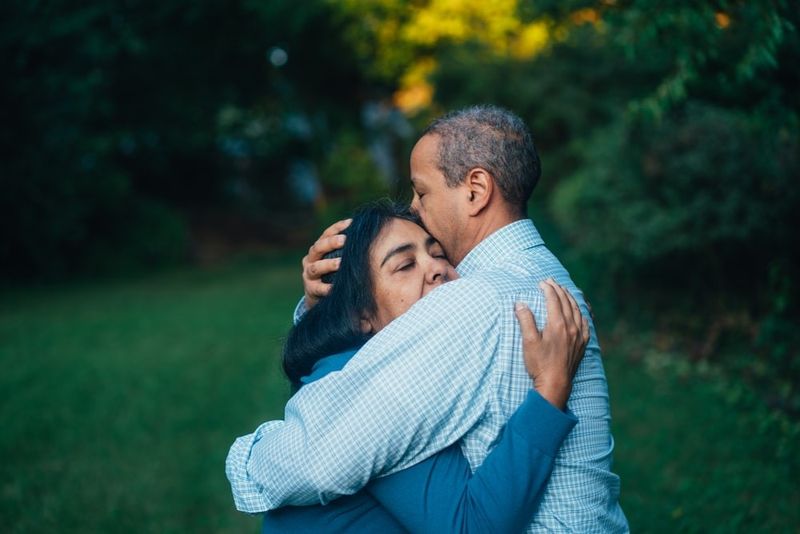15 Hard Lessons You Only Learn After Years Of Marriage

Marriage is a journey filled with evolving dynamics and unexpected revelations. Over the years, couples discover quiet truths that reshape their perspectives and bring clarity to the relationship’s depth. These lessons, often learned through trials and shared experiences, redefine what it means to grow together.
This blog post uncovers fifteen of these profound insights that only time can teach, offering a candid look into the realities of enduring partnership. From communication nuances to emotional growth, these are the lessons that cultivate a lasting bond.
1. These Lessons Take Time—And Sometimes a Few Arguments

Arguments are not the enemy in marriage; rather, they are opportunities for growth. With time, couples learn that each disagreement can be a stepping stone to deeper understanding. It’s not about winning but about navigating the conflict with empathy. Through these arguments, couples develop resilience and a toolkit for handling future challenges. This process requires patience and a willingness to listen without judgment.
Over the years, partners realize that the goal isn’t to avoid arguments altogether but to handle them with grace and mutual respect. As these lessons settle in, arguments become less about division and more about finding common ground. This journey of discovery strengthens the bond, forging a partnership that values growth over perfection.
2. Love alone doesn’t hold it all together

Love is the foundation, but it isn’t the entire structure of a lasting marriage. Couples soon recognize that love needs to be supported by commitment, understanding, and shared responsibilities. It’s the daily efforts and choices that maintain the bond. Love may spark the connection, but what truly holds it together are the actions and decisions made in its name.
Over time, partners come to understand that love requires nurturing through companionship, trust, and continuous effort. It’s not always a fairy tale; it’s a conscious commitment to sustain each other through life’s ups and downs. This realization transforms the relationship from a romantic ideal into a practical partnership built on mutual respect and support.
3. Communication is more about tone than timing

In marriage, how you communicate often speaks louder than when you communicate. Couples learn that tone can either bridge gaps or create chasms. A gentle approach fosters openness, inviting honest dialogue and connection. Over time, partners discover that timing, while important, is secondary to the way words are delivered.
A harsh tone can shut down conversation, while a soft one encourages sharing and vulnerability. This insight shifts the focus from arguing about when to talk to how to speak kindly and constructively. As partners embrace this lesson, they find that their communication becomes more effective and enriching, turning potential conflicts into meaningful discussions.
4. Silence isn’t always peace

While silence can be comfortable, it can also be a sign of unresolved issues. Couples often misinterpret silence as peace, only to find that it masks deeper feelings. In a long-term relationship, partners learn to read between the lines. Silence can sometimes signal withdrawal or disconnection. Over the years, couples realize the importance of addressing quiet moments.
They learn to check in with each other, ensuring that silence is a choice rather than a default. This awareness leads to more proactive communication and a stronger emotional connection. Ultimately, the lesson is that genuine peace comes from understanding and addressing the silence, transforming it into a shared space of trust and intimacy.
5. Keeping score slowly ruins closeness

In marriage, the habit of keeping score can gradually erode intimacy. Partners who tally up perceived wrongs or favors often find themselves drifting apart. Over time, they learn that a relationship isn’t a competition. Instead, it’s about mutual support and forgiveness. Letting go of grievances fosters a healthier environment where love can thrive.
This lesson teaches couples to appreciate each other’s efforts without measuring them against their own. By releasing the need to keep score, partners create a space where generosity and understanding flourish. The absence of scorekeeping allows for a more genuine connection, where both can celebrate each other’s victories and navigate challenges together.
6. You can grow at different paces and still stay together

In a long-term marriage, growth doesn’t always happen simultaneously. Partners may find themselves evolving at different speeds. This divergence can be challenging, but it’s also an opportunity for enrichment. Couples learn to respect each other’s journeys without feeling threatened. They discover that individual growth contributes to the relationship’s depth and strength.
Over time, partners realize that it’s possible to grow apart without growing away from each other. By supporting each other’s paths and maintaining a shared vision, they create a dynamic partnership that adapts to life’s changes. This lesson underscores the beauty of diversity within unity, where personal growth enhances the collective bond.
7. Some days feel more like work than romance

The reality of marriage is that not every day is filled with romance. Some days are simply about getting through the to-do list. Partners learn that this isn’t a sign of a failing relationship but a natural part of life together. The mundane tasks and responsibilities can feel like work, but they also form the backbone of a shared life.
Over time, couples realize that these days of effort are equally important as those filled with love and laughter. Embracing the balance between the ordinary and the extraordinary creates a resilient partnership. This understanding allows couples to appreciate all aspects of their relationship, defining love through actions as much as emotions.
8. Resentment builds when you ignore the small stuff

The small irritations, if left unchecked, can grow into deeper resentments over time. Partners learn that addressing the little things prevents the buildup of frustration. This proactive approach requires mindfulness and a willingness to speak up about minor concerns. The lesson here is to value open communication and not dismiss what seems trivial.
As couples become attuned to each other’s needs, they cultivate an environment of mutual respect and understanding. Taking care of the small stuff prevents it from becoming big issues, nurturing a healthier and more harmonious relationship. This commitment to attentiveness reinforces the bond, ensuring that love is expressed in both significant and subtle ways.
9. You won’t always feel “in love”—and that’s okay

Feelings of love can ebb and flow, and this is a natural part of long-term relationships. Couples learn to accept these fluctuations without panic. They understand that love is more than a constant high; it’s a steady presence that endures. This lesson helps partners navigate periods of emotional distance without fear. By trusting in the relationship’s foundation, they find comfort even when the intensity of love wanes.
Over time, couples discover that enduring love is not about always feeling “in love” but about choosing each other every day. This understanding transforms temporary feelings into a lasting commitment, fostering a love that is both deep and resilient.
10. Support doesn’t always look like advice

In marriage, support is often mistaken for offering solutions. However, couples learn that sometimes the best support is simply listening. This understanding shifts the focus from fixing problems to validating experiences. Partners begin to appreciate the power of presence and empathy. They realize that offering a listening ear can be more comforting than dispensing advice.
Over time, this lesson deepens the emotional connection, as partners feel heard and valued. By prioritizing listening over advising, couples create a safe space for expression. This shift fosters a relationship where both partners are free to share their thoughts, knowing they will be met with understanding rather than judgment.
11. Apologies matter—but behavior change matters more

An apology is an important step in mending fences, but it’s the accompanying change in behavior that truly repairs relationships. Couples learn that words are just the beginning of the reconciliation process. Real progress comes when actions align with promises. This lesson teaches partners the importance of accountability and growth.
Over time, they understand that genuine apologies involve commitment to improvement. An apology followed by unchanged behavior loses its weight. By focusing on actions rather than just words, couples build a trust that is solid and enduring. This commitment to change reinforces the partnership, showing that love is expressed through both heartfelt apologies and meaningful actions.
12. Feeling unappreciated happens in both directions

In marriage, both partners can experience feelings of being unappreciated. Over time, couples learn that these feelings aren’t one-sided. Recognizing each other’s efforts becomes essential in maintaining balance and harmony. This lesson encourages partners to express gratitude regularly, acknowledging both big gestures and small acts of kindness.
Appreciation becomes a two-way street, fostering a culture of mutual respect and acknowledgment. By actively noticing and valuing each other’s contributions, couples strengthen their bond. This practice of appreciation not only prevents resentment but also deepens the emotional connection, ensuring that both partners feel valued and loved in the relationship.
13. It’s possible to feel lonely in the same room

Being physically present doesn’t always equate to emotional connection. Couples learn that they can be in the same room and yet feel worlds apart. This lesson highlights the importance of intentional engagement. Over time, partners discover that maintaining connection requires effort and attentiveness. They find ways to bridge the gap by creating opportunities for meaningful interaction.
By recognizing moments of distance, couples work to close it with shared activities or conversations. This awareness transforms coexistence into companionship, reinforcing the relationship. Ultimately, the lesson is about choosing presence over proximity, ensuring that love is felt even in quiet moments.
14. Emotional safety matters more than constant excitement

Excitement may be fleeting, but emotional safety provides lasting comfort. Couples learn that feeling secure in a relationship is more valuable than constant thrills. This lesson underscores the importance of trust and stability. Over time, partners come to appreciate the calm assurance of being with someone who truly understands them.
Emotional safety becomes the bedrock upon which love is built. By prioritizing this aspect, couples create an environment where both can be their authentic selves. This focus on security over excitement fosters a deep and enduring connection, turning the relationship into a sanctuary of acceptance and unconditional love.
15. Forgiveness takes practice, not just intention

Forgiveness is a journey that requires more than just the intention to let go. Couples learn that it takes practice and patience. This lesson teaches partners that forgiveness is an ongoing process, often requiring repeated efforts. Over time, they understand that genuine forgiveness involves navigating complex emotions and rebuilding trust.
By embracing this practice, couples create a relationship where mistakes are opportunities for growth rather than sources of resentment. This commitment to forgiving and moving forward strengthens the bond, turning challenges into experiences that deepen the connection. The lesson here is that forgiveness, like love, is a continuous choice that shapes the relationship’s future.
